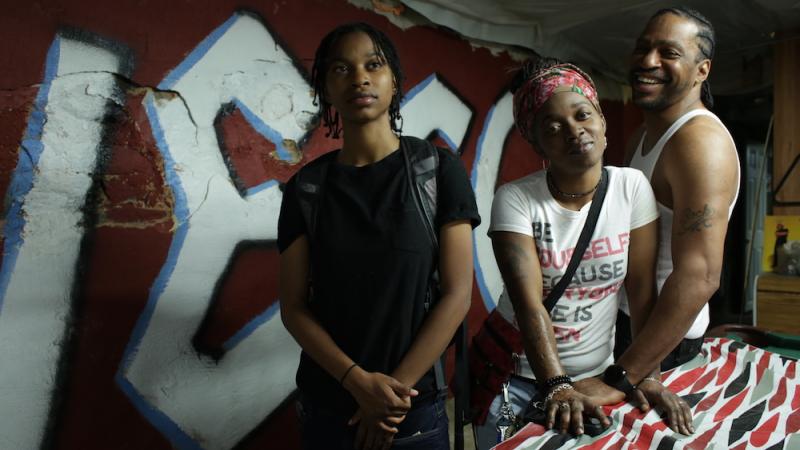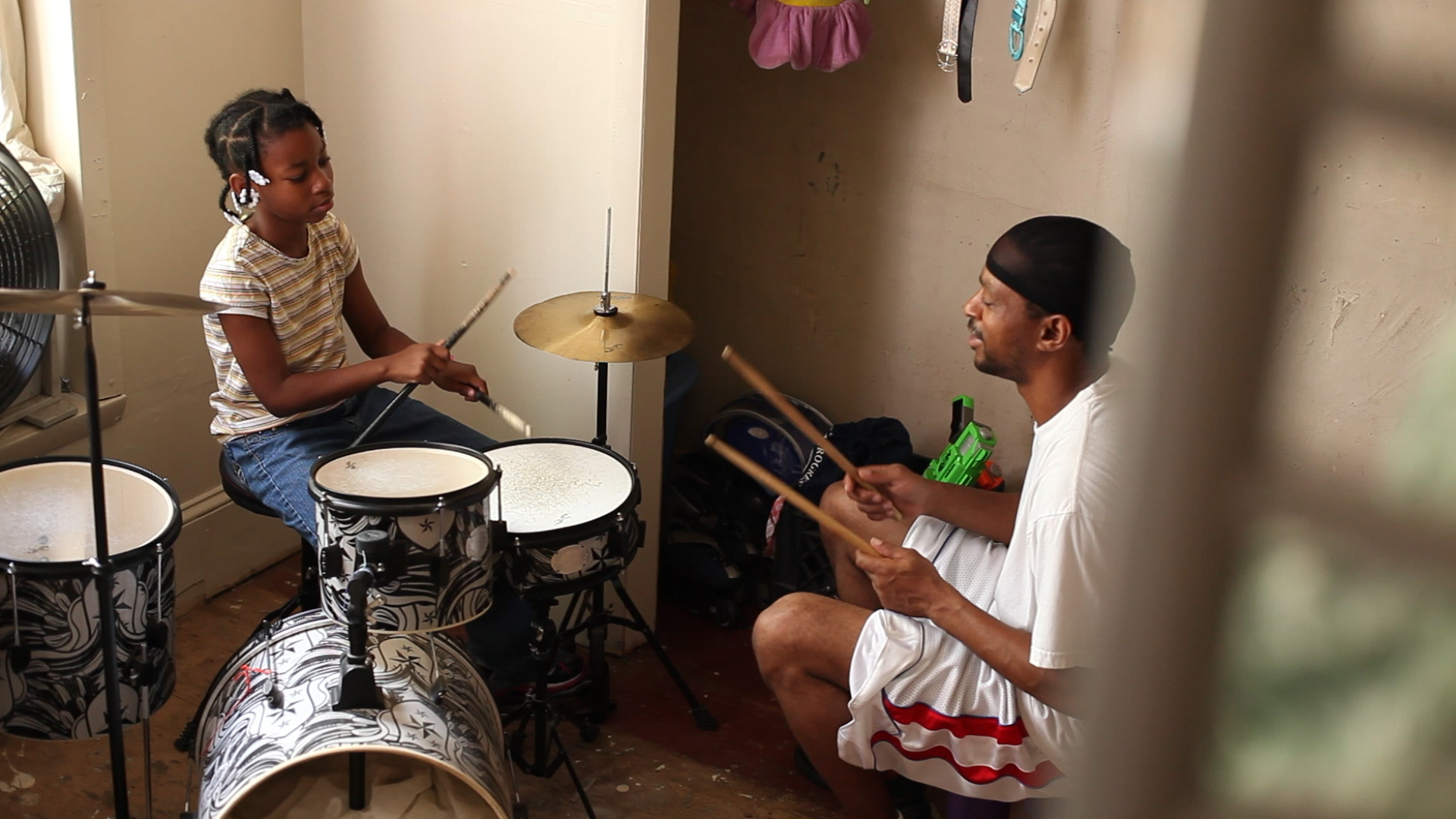Quest review - intimate documentary about a north Philly community | reviews, news & interviews
Quest review - intimate documentary about a north Philly community
Quest review - intimate documentary about a north Philly community
Jonathan Olshefski's film takes us into the heart of an African-American family

Christopher Rainey, aka "Quest" – his hip-hop name – lives with his wife Christine’a and their young daughter PJ in north Philadelphia.
Quest and Ma Quest, as she’s known, have plenty of back stories and grown children from other relationships, but "tired of the bullshit, the crap and people doing each other wrong" they’ve decided to commit to one another, even though they say they’re complete opposites and don’t even like the same TV shows (she likes CSI, he’s a cartoon man). The film starts with their wedding, but their connection already has long-term strength.
The Rainey’s community spirit shines through, against a background of red brick Philly row houses, bodegas, hair-braiding (Christine’a is never far from a comb and a head of hair that needs doing) and basketball courts. Quest runs a music studio in his house where kids from the neighbourhood can rap and record on Friday nights – he sees himself as planting seeds and letting them grow – and is a regular on a local radio show; Christine’a works in a homeless shelter for women and children. PJ (pictured below with Christopher "Quest" Rainey) wants to be a DJ and recorded her first song when she was three. “Could you go back to when you were about five because you were the coolest five-year-old ever?” her mother asks her. “I know,” smiles PJ.
 This is Olshefski’s first feature and it is a tribute to his deep connection with the Raineys – and what must have been a mammoth editing process by Lindsay Utz – that the film unfolds with such grace over the years. The inevitable question is: why is a white man making a documentary about a black community? Olshefski was teaching a photography class near the Raineys' home when he met the family and his original plan was to promote the music studio, but as time went on they invited him to film more and more intimate moments in their lives – often very painful ones.
This is Olshefski’s first feature and it is a tribute to his deep connection with the Raineys – and what must have been a mammoth editing process by Lindsay Utz – that the film unfolds with such grace over the years. The inevitable question is: why is a white man making a documentary about a black community? Olshefski was teaching a photography class near the Raineys' home when he met the family and his original plan was to promote the music studio, but as time went on they invited him to film more and more intimate moments in their lives – often very painful ones.
Christine’a’s 21-year-old son William has a brain tumour, diagnosed after his girlfriend was pregnant, and both Raineys have happily taken over the care of their baby grandson while William undergoes gruelling radiation treatment (he gets a biohazard tattoo and feels like “infectious waste”). Quest hints at his own past addictions while trying to reason with his long-term music partner Price, who’s struggling with drink and drugs and wasting his talent as a rapper. Their roof leaks badly, there isn’t enough money for school supplies. But these set-backs are nothing compared to what happens to PJ when she’s 13. She’s caught in cross-fire when coming home from basketball practice and loses an eye.
This tragedy is handled with great sensitivity, and the family’s quiet dignity makes it even more devastating. PJ’s first words to her father, with blood running down her face, were “Daddy, I’m sorry for getting shot.” “What do you say to that?” muses Rainey. Politicians, he tells a local TV news channel, come to the area to open casinos but there’s nowhere for kids to go after school. “Anger, sadness, confusion… it’s like a fire in my heart,” says Christine’a. “It shouldn’t have happened to her.” But a block-party is organised for PJ’s homecoming from hospital, with dancing and hot-dogs, though PJ’s irritation with well-meaning, over-emoting neighbours is palpable. “They’re making me think about my eye more,” she says. She returns to the basketball courts, intent on getting her balance back and her jump-shots right.
The last moments show William in remission with his four-year-old son and PJ getting her hair relaxed for her graduation photograph. Trump is on TV. “What do you have to lose? It’s a disaster how African Americans are living,” he blusters on the campaign trail. “You don’t know how we live,” says Christine’a with her usual restraint. Olshefski’s film is able to show us, and celebrate it.
rating
Explore topics
Share this article
The future of Arts Journalism
You can stop theartsdesk.com closing!
We urgently need financing to survive. Our fundraising drive has thus far raised £49,000 but we need to reach £100,000 or we will be forced to close. Please contribute here: https://gofund.me/c3f6033d
And if you can forward this information to anyone who might assist, we’d be grateful.

Subscribe to theartsdesk.com
Thank you for continuing to read our work on theartsdesk.com. For unlimited access to every article in its entirety, including our archive of more than 15,000 pieces, we're asking for £5 per month or £40 per year. We feel it's a very good deal, and hope you do too.
To take a subscription now simply click here.
And if you're looking for that extra gift for a friend or family member, why not treat them to a theartsdesk.com gift subscription?
more Film
 The Courageous review - Ophélia Kolb excels as a single mother on the edge
Jasmin Gordon's directorial debut features strong performances but leaves too much unexplained
The Courageous review - Ophélia Kolb excels as a single mother on the edge
Jasmin Gordon's directorial debut features strong performances but leaves too much unexplained
 Blu-ray: The Graduate
Post #MeToo, can Mike Nichols' second feature still lay claim to Classic Film status?
Blu-ray: The Graduate
Post #MeToo, can Mike Nichols' second feature still lay claim to Classic Film status?
 Little Trouble Girls review - masterful debut breathes new life into a girl's sexual awakening
Urska Dukic's study of a confused Catholic teenager is exquisitely realised
Little Trouble Girls review - masterful debut breathes new life into a girl's sexual awakening
Urska Dukic's study of a confused Catholic teenager is exquisitely realised
 Young Mothers review - the Dardennes explore teenage motherhood in compelling drama
Life after birth: five young mothers in Liège struggle to provide for their babies
Young Mothers review - the Dardennes explore teenage motherhood in compelling drama
Life after birth: five young mothers in Liège struggle to provide for their babies
 Blu-ray: Finis Terrae
Bleak but compelling semi-documentary, filmed on location in Brittany
Blu-ray: Finis Terrae
Bleak but compelling semi-documentary, filmed on location in Brittany
 Oslo Stories Trilogy: Sex review - sexual identity slips, hurts and heals
A quietly visionary series concludes with two chimney sweeps' awkward sexual liberation
Oslo Stories Trilogy: Sex review - sexual identity slips, hurts and heals
A quietly visionary series concludes with two chimney sweeps' awkward sexual liberation
 Sorry, Baby review - the healing power of friendship in the aftermath of sexual assault
Eva Victor writes, directs and stars in their endearing debut feature
Sorry, Baby review - the healing power of friendship in the aftermath of sexual assault
Eva Victor writes, directs and stars in their endearing debut feature
 Blu-ray: Who Wants to Kill Jessie?
Fast-paced and visually inventive Czech comedy
Blu-ray: Who Wants to Kill Jessie?
Fast-paced and visually inventive Czech comedy
 Oslo Stories Trilogy: Love review - freed love
Gay cruising offers straight female lessons in a heady ode to urban connection
Oslo Stories Trilogy: Love review - freed love
Gay cruising offers straight female lessons in a heady ode to urban connection
 Beating Hearts review - kiss kiss, slam slam
Romance and clobberings in a so-so French melodrama
Beating Hearts review - kiss kiss, slam slam
Romance and clobberings in a so-so French melodrama
 Materialists review - a misfiring romcom or an undercooked satire?
Writer-director Celine Song's latest can't decide what kind of film it is
Materialists review - a misfiring romcom or an undercooked satire?
Writer-director Celine Song's latest can't decide what kind of film it is

Add comment